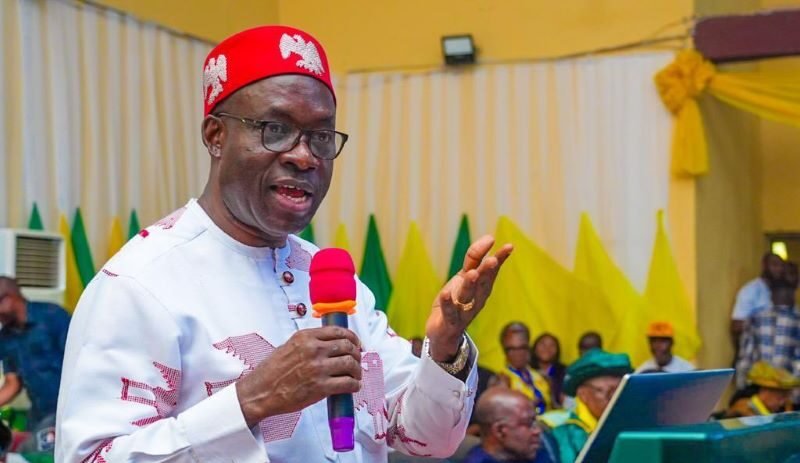THE All Progressives Grand Alliance (APGA) candidate and incumbent governor of Anambra State, Prof. Chukwuma Soludo, has taken a commanding early lead in the Anambra State governorship election held on Saturday, amid reports of vote-buying, security breaches, and logistical concerns across several local government areas.
News Point Nigeria reports that as of 1am Sunday morning, the Independent National Electoral Commission (INEC) had uploaded 99.14 per cent of polling unit results on its INEC Results Viewing (IReV) portal, covering most of the 5,718 polling units spread across 21 local government areas.
INEC confirmed that 2,802,790 voters were registered for the poll including 140,370 newly registered voters. However, turnout was significantly lower than expected, despite an increase in the number of Permanent Voter Cards (PVCs) collected before the election.
Preliminary results show Soludo performing strongly in his home base and multiple urban blocs, establishing a broad lead over his closest rival, the All Progressives Congress (APC) candidate, Senator Nicholas Ukachukwu.
The APGA candidate swept his own polling unit, Umuezeadigo Street, Polling Unit 002 in Isuofia with 417 votes, while APC scored four votes.
Across Aguata, Anaocha, Ekwusigo, Onitsha North, Onitsha South, and Ogbaru LGAs, APGA commanded large margins:
Ekwusigo LGA:
APGA — 1,548 votes
APC — 599 votes
Njikoka LGA:
APGA — 3,452 votes
APC — 666 votes
Anaocha LGA:
APGA — 2,419 votes
APC — 724 votes
In Orumba South, APGA secured crushing victories in Umuchukwu Ward 09 (547 votes) and Nawfija Ward 08 (707 votes), dwarfing APC’s totals of 87 and 123 respectively.
Meanwhile, APC’s Ukachukwu won his polling units in Umudiala village, Nnewi South LGA — taking 108 votes and 126 votes in two booths, while APGA scored 4 and 6 votes respectively.
However, the Labour Party (LP) candidate, Dr. George Moghalu, lost his polling unit, scoring 22 votes to Soludo’s 57.
The results so far indicate a two-horse race between APGA and APC, with a significant lead for the incumbent.
The exercise was tainted by widespread reports of vote-buying prompting political parties to trade accusations.
Labour Party chieftain and former governor, Mr. Peter Obi, condemned the trend: “Vote-buying is on the scale of N20,000 to N30,000.
Victims of bad governance are the ones selling their future.”
Governor Soludo alleged that voters in Nnewi South were being paid up to N15,000 to sell their votes.
APC’s Ukachukwu also raised alarms: “This is becoming a dangerous norm undermining democracy.”
The EFCC spokesperson, Dele Oyewale, confirmed the arrest of three suspected vote-buyers in Njikoka, Oyi, and Dunukofia LGAs.
The election witnessed isolated but deadly violence, including the killing of a councillor representing Owerre Ezukala in Orumba South. Witnesses said he was shot dead by gunmen around 1:30 pm while attempting to vote.
In Ihiala, tension erupted when security agents fired tear gas at the INEC secretariat — injuring a corps member and an election observer. Witnesses accused the officers of being intoxicated.
The police said the incident had been “resolved,” describing it as a minor misunderstanding.
Despite generally early deployment of materials, several elderly voters were unable to be accredited due to BVAS facial recognition failures.
A 76-year-old woman in Njikoka lamented: “We were told our faces have changed.”
Some youths in Awka were seen playing football during voting hours, while traders in Onitsha defied movement restrictions to operate roadside markets.
State Returning Officer, Prof. Edogah Omoregie of the University of Benin, adjourned collation at the state INEC headquarters in Awka at about 1:30 a.m., announcing that the process would resume by 8:00 a.m. on Sunday.







